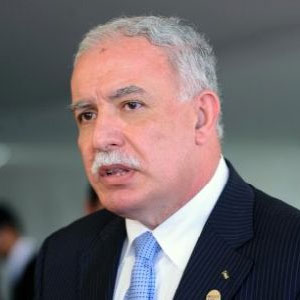Palestinian officials have so far enlisted the support of at least six or seven members of the 15-member Security Council in their bid to gain United Nations recognition as a sovereign state, a senior official said Tuesday ,dpa reported.
They are trying to convince two or three more Security Council members to vote in favour of accepting Palestine as a UN member state, Palestinian Authority Foreign Minister Riad Malki said.
The Palestinians hope to enlist nine members behind them, even if "the US is going to veto it and embarrass itself," he told Voice of Palestine Radio from New York.
For any decision to pass in the 15-member Council, nine affirmative votes are needed, as well as no veto by any of the permanent Security Council members. The United States holds a veto and has promised to use it, if necessary
Even as Palestinian diplomats work feverishly to enlist the nine votes to achieve a moral victory - even if it results in a technical defeat - US diplomats were working frantically to muster a blocking minority of seven.
Washington wants to avoid having to use its veto and appear as having single-handedly foiled the Palestinian bid.
So far only Germany and Colombia, which receives much financial support from the US for fighting rebels and drug lords, are said to be with the US and Israel. France and Britain remain unclear.
The Palestinians are trying to win over Gabon, Nigeria and Bosnia-Herzegovina. The first, west-central African state seemed to have made up its mind to vote for the Palestinians, but the other two remained hesitant, Malki said.
Portugal, earlier still defined as undecided, by Tuesday seemed inclined to vote with the Palestinians, Israeli officials said.
Palestinian President Mahmoud Abbas told UN Secretary General Ban Ki-moon in New York Monday he would go ahead and submit the membership application on Friday, immediately after his address to the General Assembly's 66th session.
Israeli Prime Minister Benjamin Netanyahu, ahead of his scheduled departure to the General Assembly session late Tuesday or early Wednesday, called on Abbas to meet with him in New York.
"I call on the chairman of the Palestinian Authority to open direct negotiations in New York, which would continue in Jerusalem and Ramallah," he said in statement from his Jerusalem office.
"I propose to President Abbas to begin peace negotiations instead of wasting time on futile unilateral measures."
Abbas replied he was willing to meet Netanyahu in New York, but for protocol purposes, not to relaunch negotiations.
"I am ready to meet any Israeli official at any time he wants, but to meet only for meeting, I think it's useless," he told Fox News.
Abbas has conditioned negotiations on an Israeli construction freeze in the occupied West Bank and East Jerusalem. Netanyahu insists on negotiations without preconditions. The last round of talks broke off one year ago.
Malki said Abbas was under heavy pressure not to submit the application.
Europe is trying to convince Abbas not to go to the Security Council, but to the General Assembly, for a watered-down request.
"The president was clear in his position," Malki said.
"He told them we are committed to going to the Security Council for full UN membership and we will not accept anything less."
But a senior Israeli government official warned this would be a "mistake" that goes against past Israeli-Palestinian interim deals.
"Ït's impossible to impose peace from the outside. It won't happen," Mark Regev told correspondents in Jerusalem. Meanwhile, an opinion poll published Tuesday said the vast majority of Palestinians (83 per cent) support Abbas' bid.
The poll by the Ramallah-based Palestinian Centre for Policy and Survey Research (PSR) interviewed some 1,200 Palestinians in the West Bank, East Jerusalem and Gaza between September 15-17, and had a margin of error of 3 per cent.






